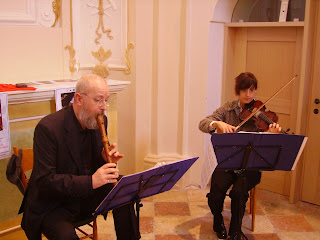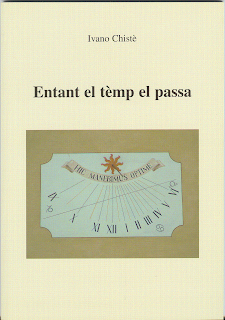Attualmente i componenti sono i seguenti. 
Ivano Chistè : Flauti, mandolino, accordion, guitar, harmonica, vocals.

Fiorenzo Fedel : guitar, acoustic bass, vocals.

Stefania Filippi : violin, voice.

Maria Grazia Gadotti : percussion, chorus, narrator.

large part of European popular music draws liberally in the reservoir of medieval and renaissance music. In ancient times, the gap oggi esistente tra musica sacra e musica profana oppure tra musica colta e musica popolare non era netto come ai tempi nostri. Ancora ai tempi della riforma (1519) era abitudine adattare a testi sacri musiche profane e viceversa e questa pratica, veniva chiamata “ parodia “ o “ contrafactum ”.

Il gruppo cerca di intraprendere un viaggio che dalle profonde radici musicali dell’Europa medievale, conduce l’ascoltatore attraverso le musiche popolari di alcuni stati europei, per arrivare quindi nel nuovo mondo dove per altro, si possono trovare nelle melodie autoctone, per effetto di massicce ondate di emigranti, echi di melodie europee.

Le musiche che eseguiamo, non seguono un percorso rigoroso dal punto di vista storico e filologico, ma sono filtrate attraverso la nostra sensibilità ed il nostro modo sentire la musica stessa.

Parallelamente all’attività concertistica proponiamo lo spettacolo, “ Appunti disordinati di viaggio ” nel quale alterniamo musica e poesia.

Gli Aires si sono performed in different squares and theaters in Trentino (Trento Mountain Film Festival, Palace Hotel Roncegno, etc.). The band members come from diverse musical backgrounds (classical and folk).
Magic Celtic

parallel to the repertoire of music from the world, let alone occasional concert music of the Anglo-Scots-Irish .

Thanks to the friends of the Association of Zivireel Zivignago, this year we Magic played at Celtic.

It was a great thrill to play on stage at Celtic Magic for the large audience and for the pleasure to share it with internationally renowned musicians.

Aires Iron Strings

In the early '900, were in our province (Trentino) numerous orchestras plectrum. They were made up of mandolin, mandola, mandocello, guitar and bass. Of course, there were groups very refined, but were called derogatory manner "orchestras Fil de Fer" (wire).

The name of our group is inspired by this tradition, but of course that of the Old Time music and bluegrass array of North American where they have the "String Band" are groups that consist only of instruments strings, guitar, mandolin, banjo, fiddle, dobro and bass.
Aires Iron Strings The project was born in August 2008 in the Cultural Panic of the Sun, where there are musicians who are dedicated to other genres. For this reason, over the years, even to meet, as required by statute, they set out various projects.

The group seeks to take a musical journey from the roots of the Anglo-Scots-Irish, leads the listener into the new world to another, can be found in the native songs, the effect massive waves of immigrants, echoes of European melodies.
The music we perform, be they Irish, old time or bluegrass, do not follow a rigorous point of view of history and philology, but are filtered through our feelings and the way we listen to the music itself.

In our journey through American music, he could certainly miss the prince of the genre overseas, and between a song and an old time bluegrass also play some blues.

From October 2009 he entered the training Danilo  The band members come from experiences related to folk music
The band members come from experiences related to folk music Ivano Chistè : Guitar, mandolin, harmonica, vocals

Bruno Decarli : Banjo, dobro, backing vocals. 
Danilo De Pasqual : electric bass, guitar, backing vocals.

Fiorenzo Fedel : guitar, acoustic bass, vocals.

Ayres

The project Ayres was born in 2001 in the Cultural Panic of the Sun, where there are musicians who are dedicated to different genres of music. Over the years, this project has had ups and downs and has regularly been left by the wayside. For some time we came back the old music and we want to propose it again.
 Ayres is an English word that means a quick lyrical composition for solo voice with lute accompaniment. The music we perform, Renaissance and Baroque, do not follow a rigorous point of view of history and philology, but are filtered through our sensitivity and the way we listen to the music itself.
Ayres is an English word that means a quick lyrical composition for solo voice with lute accompaniment. The music we perform, Renaissance and Baroque, do not follow a rigorous point of view of history and philology, but are filtered through our sensitivity and the way we listen to the music itself.
























 The band members come from experiences related to folk music
The band members come from experiences related to folk music 




 Ayres is an English word that means a quick lyrical composition for solo voice with lute accompaniment. The music we perform, Renaissance and Baroque, do not follow a rigorous point of view of history and philology, but are filtered through our sensitivity and the way we listen to the music itself.
Ayres is an English word that means a quick lyrical composition for solo voice with lute accompaniment. The music we perform, Renaissance and Baroque, do not follow a rigorous point of view of history and philology, but are filtered through our sensitivity and the way we listen to the music itself. 










